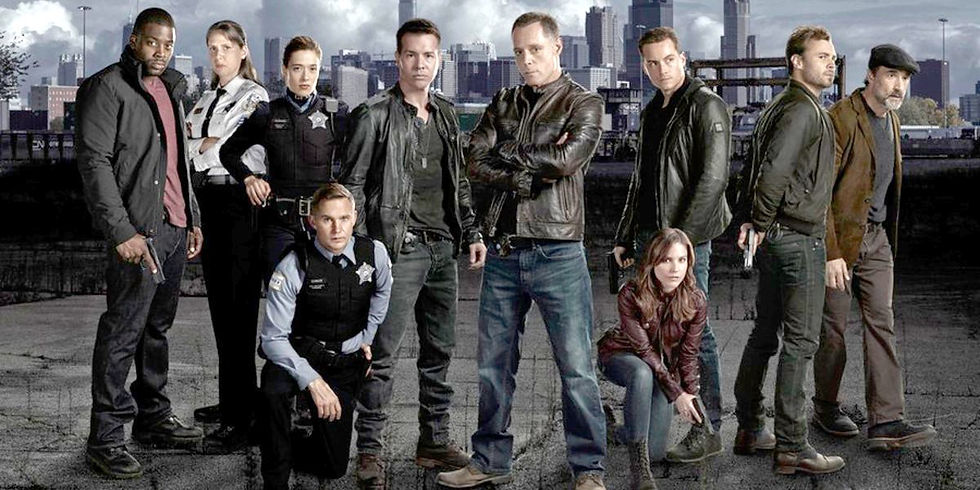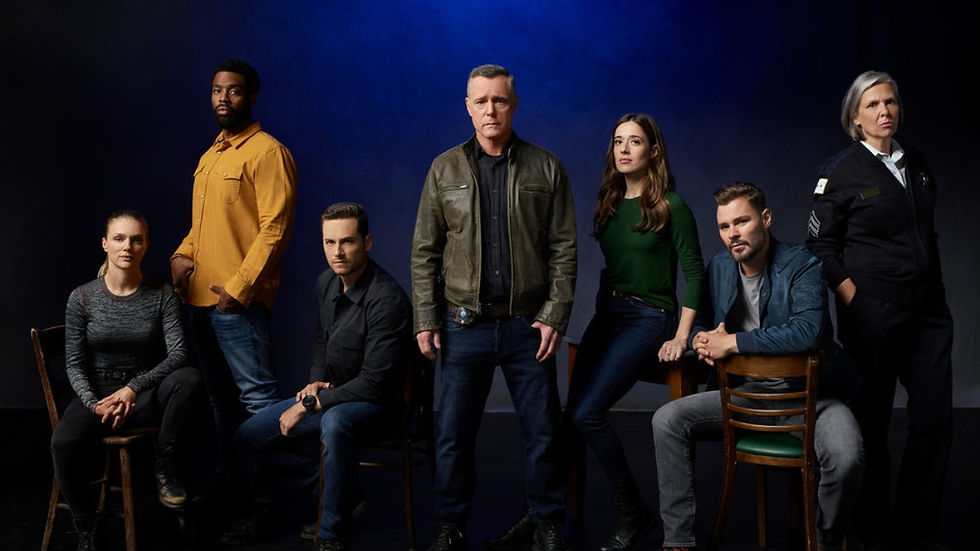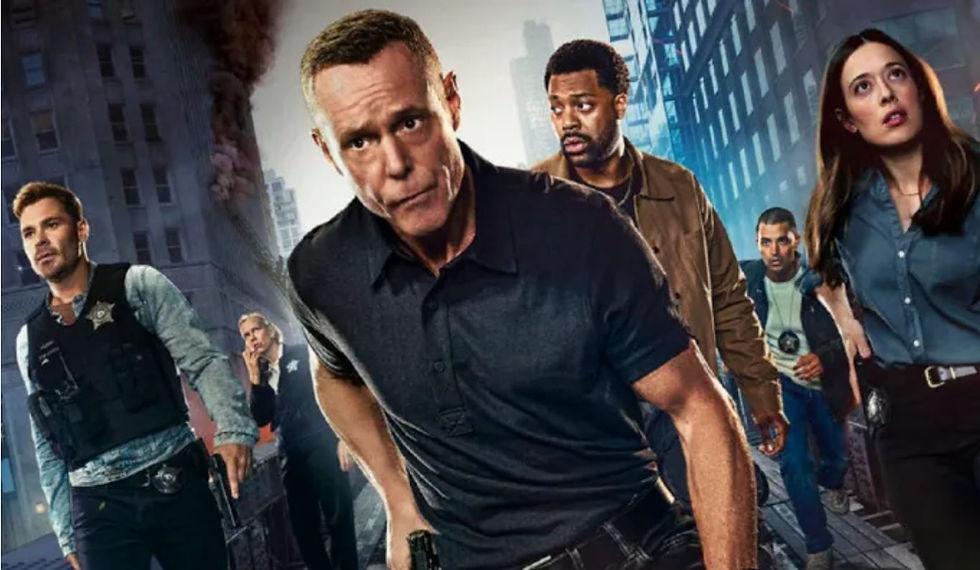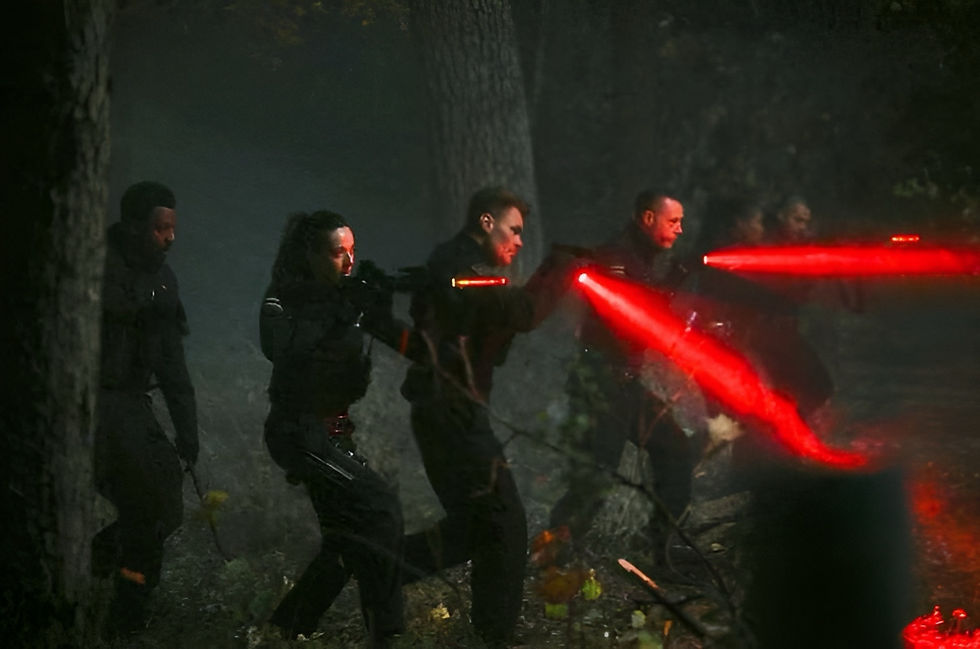Fans Demand the Return of Gritty Patrol Stories: Why Chicago PD Needs to Get Back to Its Roots
- Jo Marie

- 5 days ago
- 12 min read
From Romance to Realism: The Call for Authentic Street-Level Policing in America’s Heartland Drama

Chicago PD, the flagship police procedural known for its raw street grit and unflinching look at the city’s underbelly, has been a staple of network television since its 2014 debut. Over the years, it has amassed a fervent and loyal fanbase, drawn to its unapologetically tough, pulse-pounding depiction of law enforcement on Chicago’s streets. But as the show has evolved, so too have fan concerns, with a growing chorus echoing a single, urgent demand: bring back the gritty patrol stories.
The most passionate viewers—those who have stood by the Intelligence Unit through every betrayal, every shootout, every heartbreak—are now voicing disillusionment as Chicago PD shifts away from its street-level roots. Where once the show was a tightly wound tapestry of crime, chaos, and consequence, recent seasons have leaned heavily into romance, interpersonal drama, and soap opera–esque entanglements. The landmark wedding of Burgess and Ruzek, while a milestone for many, has for some highlighted the series’ drift from the unfiltered realism that first roped them in.
So, what’s behind the groundswell of longing for the show’s original flavor? Why do fans crave the dark, dangerous world of police patrol over love triangles and office politics? And what can Chicago PD do to answer this call—both for its own creative health, and for the fans who yearn for a return to form? Let’s dive deep.
The Allure of the Streets: Chicago PD’s Original Magic
When Chicago PD premiered, it hit the airwaves with a jolt of adrenaline. The city itself was a character: brooding, unpredictable, and alive with the hum of real-world crime and consequence. The Intelligence Unit’s cases were ripped from the headlines, their investigations fraught with moral ambiguity and danger. Viewers weren’t just spectators; they were immersed in the city’s labyrinthine neighborhoods, feeling every foot chase, every bad call, every heart-stopping moment.
This wasn’t just a show about cops; it was about the struggle between order and chaos, the desperate humanity of those sworn to protect a city perpetually on the edge. Early seasons captured the messy, complicated reality of street policing: the violence, the camaraderie, the psychological toll. The stories were heavy, unflinching, and sometimes hard to watch—but they felt real.
This dedication to authenticity—the willingness to show not just the what, but the why behind crime and policing—resonated with fans. They saw their own city streets reflected on the screen, their own fears and hopes given voice. They were drawn to the show’s refusal to sugarcoat the cost of justice or the imperfection of its heroes.
Fan Concerns: Drifting Away From the Beat

But as Chicago PD has matured, so has its narrative focus. Increasingly, the series has pivoted toward romantic and interpersonal subplots, with the gritty patrol work taking a backseat. But as Chicago PD has matured, so has its narrative focus. Increasingly, the series has pivoted toward romantic and interpersonal subplots, with the gritty patrol work taking a backseat.
The dynamics between Burgess and Ruzek, once a compelling subplot woven into the chaos of police work, have now grown into prominent storylines. Similarly, the evolving relationship between Halstead and Upton has shifted from subtle tension in the field to central focus, drawing attention away from the high-stakes investigations. While these office romances and personal connections bring moments of emotional resonance, they've at times overshadowed the action and suspense that gave the show its edge in the early seasons.
Fans have noticed—and they’re not shy about their concerns. Social media threads, fan forums, and comment sections are brimming with impassioned pleas: “Bring back the action!” “Less dating, more detective work!” “Where are the gritty crimes, the city’s real dangers?”
For long-time viewers, the shift feels like a betrayal of what made the show unique. It’s not that romance or character growth are unwelcome; it’s that these elements should serve, not supplant, the core drama of street-level policing. Fans want to see the dangerous, unpredictable world of Chicago in all its complexity—not just the safe, sanitized spaces of the squad room or the domestic bliss of married cops.
Step back for a moment and imagine Chicago in its heyday—the wild, untamed 1920s, when the city pulsed with jazz, risk, and possibility. Gangsters like Al Capone and the legendary Chicago Outfit ruled the night, their bootlegging empires weaving through shadowy alleys and shimmering speakeasies. My own grandfather strode those very streets, not as a bystander, but as one of Capone’s main suppliers of bootleg moonshine. His nights were spent in smoky backrooms, negotiating shipments by code, feeling the weight of danger and the heady thrill of forbidden gold.
From those infamous days, every block thrummed with peril and legend. He would recount how, on cold winter nights, crates of moonshine—hidden beneath stacks of produce—were ferried past bribed officers and rival gangs, the city itself a chessboard of cunning and chance. The saga of the St. Valentine’s Day Massacre was not just a headline to him but a warning echoing through the underground, fueling the tension that ignited every nighttime escapade.
Chicago was alive with secrets back then—a place where every shadow hid a story, and my grandfather’s name slipped through the city’s whispered lore, etched into the legend of an era when anything seemed possible, and every risk could make or break a king.
Chicago’s shadowy side has long captured the public imagination. Chicago’s neighborhoods, alleys, and jazz-filled speakeasies became legends in their own right, inspiring countless stories of both criminal ingenuity and law enforcement grit.
As the decades rolled on, crime in Chicago evolved but never really faded. The city’s South and West Sides, in particular, have seen the rise and fall of countless street gangs, from the Vice Lords and the Black Disciples to the Gangster Disciples and beyond. Fast-forward to the present, and you’ll find that the landscape of urban struggle has shifted but remains just as complex and compelling. The mention of “O” Block—a nickname for a stretch of South King Drive, made famous in music and media—stands as a symbol of modern-day challenges and the city’s ongoing battle with gun violence and gang activity. These territories are not just headlines; they’re living, breathing communities, each with its own stories of resilience and hardship.
Even for those far outside Chicago’s city limits, the legend has a magnetic pull. As an avid Minecrafter, I’ve gone so far as to build a replica of “O” Block in my Chicago Build within one of my Minecraft realms—a personal homage to the city’s enduring mystique and gritty legacy. This fascination reflects just how deeply Chicago’s criminal history and street culture are etched into the global consciousness, influencing not just television and movies, but even the imaginative landscapes of digital worlds.
In truth, the city’s enduring allure—and the reason fans crave a return to those raw police patrol stories—comes from this real, ongoing narrative: a city forever locked in the struggle between order and chaos, scarred by crime, but never defined by it. The heartbeat of Chicago, both on screen and in reality, is found in the tension of those stories that have always made it legendary.
Missing the Beat: The Cost of Softening the Edges
The move away from gritty storylines hasn’t just dulled the show’s edge—it’s risked alienating its core audience. When Chicago PD first aired, it stood apart from other procedurals by refusing to flinch from hard realities: the rise of urban violence, the struggles of marginalized communities, the ever-present tension between law enforcement and the public. This was a series that took risks, that asked tough questions with no easy answers.
Now, with the narrative lens narrowed to personal relationships and melodrama, fans worry the show is losing its teeth. In a world rife with real-world challenges—gun violence, corruption, protest movements, and social upheaval—there’s an urgency to the stories that only gritty, on-the-ground policing can provide. By pulling back from the streets, fans argue, Chicago PD risks irrelevance, trading its unique voice for generic drama.
The Psychology of Grit: Why Fans Crave Realism

Why, exactly, does the audience long for a return to gritty patrol stories? To understand, we must look beyond mere nostalgia or genre preference and delve into the psychological draw of realistic crime drama.
Catharsis and Control: At its core, police procedural drama offers a fantasy of control in a chaotic world. By watching dedicated officers go head-to-head with danger and disorder, viewers experience a sense of catharsis: the bad guys get caught, the city is a little safer, justice—however imperfect—is served. When the show veers into romance or soap opera, that catharsis is diluted; the tension and resolution that define the genre are lost.
Authenticity and Escapism: Paradoxically, audiences often find escapism not in fantasy, but in realism. There’s a thrill in watching a world that feels real, populated by characters who bleed, sweat, and break. Gritty patrol stories ground the series, making every gunfight, every ethical compromise, every loss feel urgent and consequential. Fans come away not just entertained, but moved.
Reflection and Relevance: Contemporary crime drama serves as a mirror to society. In an era of social unrest and shifting public attitudes toward policing, fans want stories that engage with the real issues—racial justice, mental health, corruption, community relations. The more the show engages with these, the more relevant it feels. When it focuses on dating drama, it risks trivializing or ignoring the stakes of the world outside the precinct walls.
Suspense and Unpredictability: Gritty patrol stories thrive on suspense—the not-knowing if a beloved character will survive, the ever-present threat lurking in the city’s shadows. Romance, by contrast, is often predictable, the stakes personal rather than existential. For fans seeking the pulse of adrenaline, only the street offers true suspense.
The Call for a Return to Form: Fan Voices and Advocacy
Across online communities, the message is clear: fans want Chicago PD to return to its roots. The demand isn’t just for nostalgia’s sake; it’s grounded in a desire for the show to matter, to reflect and wrestle with the world as it is.
Many viewers cite earlier seasons—episodes like the explosive pilot, the heartbreaking loss of Alvin Olinsky, the morally ambiguous choices of Hank Voight—as examples of the show at its best. These stories didn’t just entertain; they challenged, provoked, and lingered long after the credits rolled.
Now, as the series finds itself at a crossroads, fans are organizing watch parties, launching petitions, and flooding social media hashtags with their demands. Their message is unwavering: less romance, more reality. Bring back the danger. Bring back the grit. Bring back the pulse of Chicago’s streets.
From Cop Drama to Social Commentary: Adapting to Contemporary Issues

The world has changed since Chicago PD first aired. The city of Chicago, and America itself, faces new crises and challenges: gun violence at record highs, protests in response to police misconduct, the opioid epidemic ravaging communities, growing distrust between law enforcement and the public. These are not just background noise; they are the stories that demand to be told.
Fans want Chicago PD to grapple with these issues—not with easy answers, but with the same complexity and moral ambiguity that defined its early years. They want to see the Intelligence Unit adapt to new laws and technologies, confront the rise of cybercrime, wrestle with mental health crises, and face the public scrutiny of body cameras and viral videos.
In short, fans want the series to be a mirror: to reflect the city’s pain, hope, and constant struggle for justice.
Why Romance No Longer Resonates: The Case of Burgess and Ruzek
There’s no denying the appeal of a well-crafted romance, and many fans cheered as Burgess and Ruzek finally tied the knot. Their journey—from tentative partners to married couple—has added dimension and vulnerability to both characters.
But now, with their relationship solidified, fans argue that it’s time for the narrative to move on. The tension, uncertainty, and drama that powered their romance have resolved. To continue focusing on their domestic life risks reducing two complex, capable officers to mere romantic archetypes. Fans want to see Burgess and Ruzek as cops first: navigating the city’s dangers, making impossible choices, and confronting the demons that come with the badge.
This isn’t a call to ignore character growth; rather, it’s an appeal to integrate personal lives into the broader tapestry of street-level policing. Fans want stories where love and loss are shaped by the dangers and dilemmas of the job—not stories where the job is sidelined by romance.
The Power of Suspense: Reviving Chicago PD’s Edge
Every gripping episode of Chicago PD once crackled with the raw, electric tension of the unknown. The city glimmered as a character itself—unpredictable, dangerous, its shadows hiding both tragedy and triumph. Gone were the comforts of formulaic television; in their place stood stories that made your heart race. Viewers clung to the edge of their seats, never quite sure who would walk away from the chaos, and who would be forever changed by it.
The true magic of suspense lies in its ability to make every moment matter. A single phone call at midnight could upend a detective’s life. A routine traffic stop might spiral into a citywide manhunt. The lines between right and wrong, cop and criminal, safety and peril, blurred and re-formed with every twist. It was more than just entertainment—it was an invitation to step into the night alongside the Intelligence Unit, to feel the pulse of Chicago’s streets under your own skin.
To recapture this spellbinding unpredictability, the show must lean into the city’s volatility. Let the stakes be real and ever-present. Imagine an episode where a long-time ally turns informant, fracturing trust that’s taken years to build. Or a suspect escapes, setting off a chain reaction that threatens to unravel not just the case, but the entire unit’s sense of purpose. No one is safe—not even the heroes we’ve grown to love.
But suspense isn’t just about danger—it’s about consequence. When one of Voight’s team crosses a line, the fallout should echo through the precinct, shaking loyalties and forcing impossible choices. When a rookie faces their first loss, let the grief and guilt drive them to the brink. These are the stories that haunt viewers, stories that make them question what they would do in the same circumstances.
And above all, suspense breathes life into the series by keeping even longtime fans guessing. Will the next call bring justice or heartbreak? Does a trusted partner have secrets of their own? Is redemption possible, or does the city ultimately change everyone who tries to save it?
To keep the pulse racing and the audience captivated, Chicago PD must once again embrace the uncertainty that made it iconic. Let every episode unfold like a lit fuse—sparking surprise, igniting debate, and leaving viewers breathless for more.
Charting a Path Forward: Recommendations for the Show

If Chicago PD is to answer the call of its fans and reclaim its status as the gold standard of gritty cop drama, it must be willing to take risks. Here’s how:
Refocus on Street-Level Crime: Bring back the patrol beats, the foot chases, the unpredictable encounters with the city’s worst. The show should center on the dangerous, often thankless work of policing Chicago’s streets.
Engage with Contemporary Issues: Address real-world challenges—gun violence, corruption, racial justice, mental health—with nuance and honesty. Don’t shy away from controversy; instead, use it to fuel compelling stories.
Balance Character and Action: Let personal stories emerge organically from the pressures and perils of the job. Romance, friendship, and rivalry should be shaped by the world outside the precinct, not the other way around.
Embrace Suspense and Uncertainty: Make every episode count. Let viewers feel the weight of every decision, the danger of every moment. Don’t be afraid to shock, to provoke, to leave questions unanswered.
Listen to the Fans: Use social media, fan forums, and direct feedback to gauge what the core audience wants. Engage with viewers, acknowledge their concerns, and let them know their voices matter.
Reclaiming the Heart of Chicago PD
It’s no secret: television is at its best when it surprises, challenges, and reflects the world in all its messy glory. Chicago PD, at its peak, was a masterclass in this kind of storytelling. By returning to its roots—by listening to the fans and embracing the grit, danger, and complexity of street-level policing—the show can reclaim its place as a cultural touchstone.
Fans aren’t asking for easy answers or sanitized drama. They want stories that matter, that challenge them, that linger long after the credits roll. They want to see their city, their world, reflected in all its danger and hope. They want to believe that justice, however imperfect, is worth fighting for.
The Psychological Stakes: Why Grit Resonates Now More Than Ever
In these tumultuous times, the psychology of audience demand is clear. Viewers are drawn to stories that help them process their own fears and uncertainties. When Chicago PD immerses its audience in the chaos of policing, it offers not just entertainment, but a way for viewers to grapple with their own anxieties about the world.
The gritty patrol stories, the unpredictable dangers, the moral gray zones—these aren’t just narrative devices. They’re cathartic experiences, allowing viewers to confront the violence, uncertainty, and hope that define both the city of Chicago and the world beyond.
By returning to these roots, Chicago PD can once again become a space where viewers process, reflect, and even heal. In a world where justice is always just out of reach, the show can offer a vision—flawed, uncertain, but deeply human—of what it means to fight for what’s right.
Conclusion: The Road Ahead

Chicago PD stands at a crossroads, its future uncertain but its potential undiminished. The fans have spoken, their message clear: bring back the danger, the grit, the unflinching realism that made the show a must-watch. Move away from domestic drama and romance. Tackle the real crimes, the real dangers, the real challenges facing Chicago and the world.
It’s not too late for a course correction. With courage, creativity, and a willingness to listen, Chicago PD can answer the call—and recapture the hearts and imaginations of the fans who made it a phenomenon.
The city is waiting. The streets are restless. The patrol car’s engine is idling, and the night is thick with possibility.
Will Chicago PD rise to the challenge? The answer depends, in part, on you.
Now, I invite you—our dedicated viewers and passionate fans—to join the conversation. Leave a comment below and share your thoughts. What do you hope to see in season 13? What stories, characters, or themes do you believe will make Chicago PD stronger than ever? Your insights matter, and together, we can help shape the future of this iconic series.



Comments